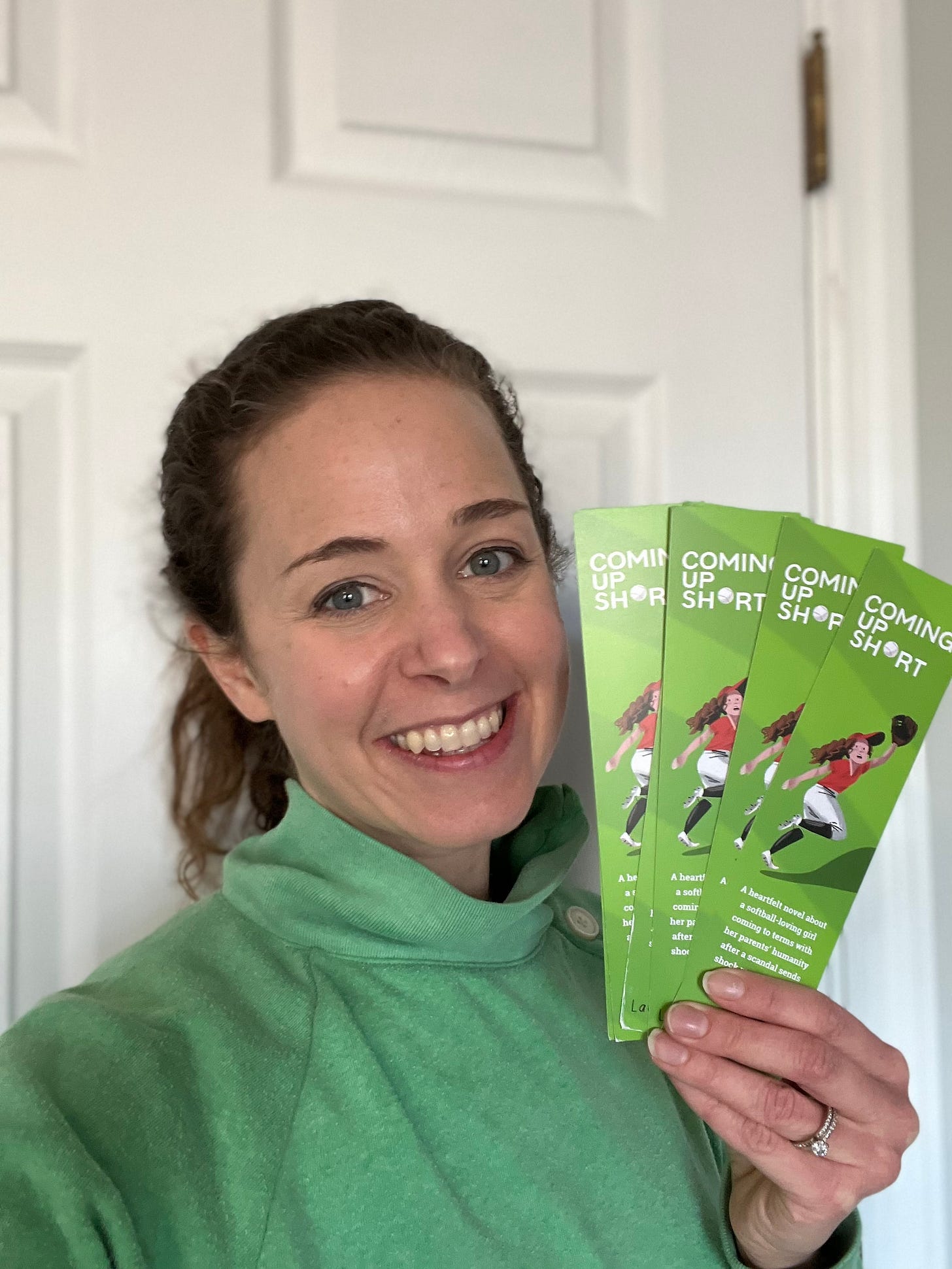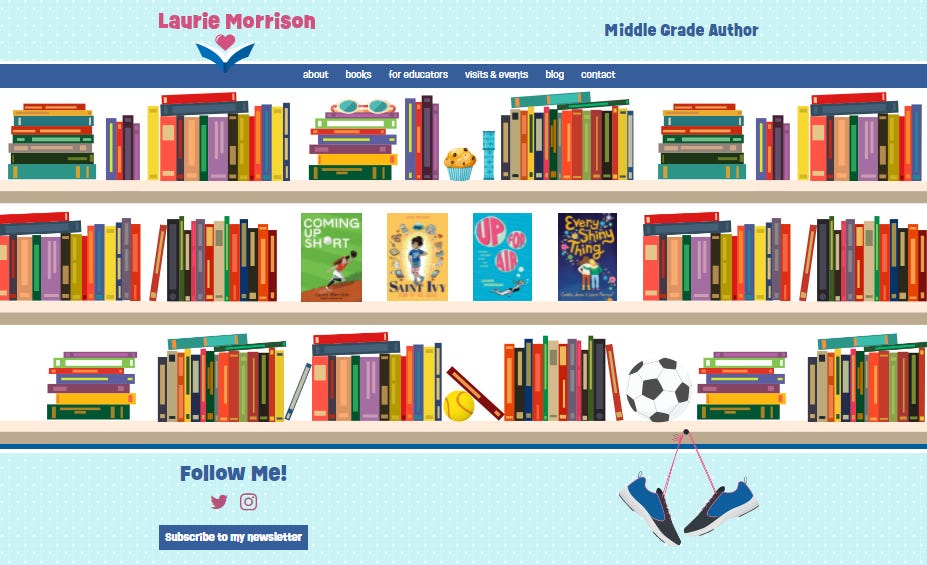Books as Time Capsules
I’ve been thinking lately about how books can be like time capsules.
I got this idea from one of my favorite podcasts, First Draft with Sarah Enni. Sarah recently interviewed Jodi Picoult and Jacqueline Woodson, who both talked about how they can look back at the books they wrote early in their careers and remember what was on their mind years ago based on what they explored in their fiction.
To be clear, I’m not trying compare myself to Jodi Picoult or Jacqueline Woodson! But I love this idea of a book as a time capsule, reflecting and preserving some of what was going on for the author at the time of writing it. So I’ve been thinking about how my next book, Coming Up Short (which I didn’t write that long ago, but what is time anymore, really?), is a time capsule for me, and that’s been a very empowering thing to consider.
I came up with the basic idea for Coming Up Short and drafted a proposal (the first 50 pages and an outline) at a time that feels like ages ago but technically wasn’t—at the end of 2019 and the very beginning of 2020. Then I put the project aside for a few months while I revised Saint Ivy (and, you know, figured out how to manage life during a pandemic). My publisher acquired Coming Up Short based on the proposal in the summer of 2020, and then I wrote the rest of the first draft that summer and fall and revised the book last winter and spring.
What that timeline means is that a lot of the big-picture parts of this novel—the basic premise, protagonist, general structure, and some of the themes—date back to pre-pandemic times. Coming Up Short was always going to be a book about sports, performance anxiety, what it’s like to be disappointed by someone you’ve put on a pedestal, and how one person cannot be responsible for another person’s happiness and emotional well-being, no matter how much they love that other person.
But as I look at the final version of the story now, I can see that everything I hadn’t figured out in the initial proposal—the secondary characters, relationships, and other themes—got shaped by all the stuff that was on my mind in late 2020 and early 2021.
The team at my publisher chose the title, Coming Up Short, from a list of softball-related possibilities I gave them when the proposal went to acquisitions in July of 2020. My working title before that had been Hang the Moon—which was totally wrong for the book, but if you read the novel you’ll understand where it came from. My brothers helped me brainstorm titles over text messages, and I thought Coming Up Short was a good one because it sounded kind of catchy and was a play on the main character’s position, shortstop.
At first, the title wasn’t that connected to the book’s themes. But as I wrote the first draft, I was struggling with pandemic parenting, constantly feeling like I was coming up short, no matter how hard I tried. So I leaned into that phrase, and the book became more and more about what it feels like to try as hard as you can and still feel like you’ve let yourself and others down.
I explored what it means to forgive ourselves and other people when we aren’t at our best, even though we’re trying our best, in part because I felt like I was never at my best and was always trying my best. I wrote about how it’s okay not to be okay sometimes, and how things feel hard because they are hard, not because we’re doing something wrong. I threw myself into writing scenes that take place at the beach in Gray Island, where the main character, Bea, goes to visit her Aunt Mary, because visiting the ocean on the pages of my novel brought me great joy at a time when I was stuck at home.
I even wrote my own inflammatory arthritis into the novel, giving Aunt Mary the same condition I have. I was in the worst cycle of pain and swelling flares I’ve ever experienced during the summer and fall of 2020, and as I sat at my computer with ice packs wrapped around my throbbing knees, it felt good to write that into the novel, so I went with it. I told myself I’d edit out that element if it seemed too random and confusing (it’s very confusing in real life, to me and to every doctor I’ve seen!), but somehow, it fit.
Currently, I’m in an anxious, in-between, waiting phase for this novel, which feels monumentally important to me and yet completely unimportant in the grand scheme of things when I consider all the terrifying, disheartening things that are happening in the world. My main job—writing and revising—has been done for months, but the book doesn’t come out until June 21st. I don’t know yet whether it will get good trade reviews or reach a lot of readers. Last spring was a difficult time to put out a midlist middle grade novel, and I don’t know if this June will be any better.
But it feels good to remember all the parts of me that made their way into this novel—some rooted in my experiences and emotions from when I was around Bea’s age, some from just last year. I like thinking of this book as a time capsule that came out of a difficult time and helped me get through that difficult time.
I’m not going to say, “It doesn’t matter what happens with this book because it brought me joy and purpose when I wrote it, and that’s enough.” The truth is that it does matter to me—a lot—what happens with this book. I hope it will find readers. I hope other people will love it as much as I do. I hope it will do well enough that I get to keep publishing books.
But when I look back someday and consider whether or not the book was a “success,” I want to make sure I factor in more than the number of copies that sell or the trade reviews it gets. Writing this book lit me up inside. It challenged and sustained me, and it made me feel like my best, fullest self. Those things matter a lot, too.
In a world and an industry in which so many things feel out of my control and hard to make sense of, I want to hold onto these things that are certain and mine. And I hope you might find it empowering to think about how your writing projects—or other creative projects—are like time capsules for you, too.

News!
I have a beautiful new author website, designed by Websy Daisy, and it’s fun, cheerful, easy to navigate, and full of information and resources. I’m especially excited about the new “for educators” page, which includes teaching guides, first chapter read-aloud videos, and video craft lessons (each about ten minutes, tackling a specific writing topic with behind-the-scenes examples from my books and concrete takeaways). Check out the site here!
Speaking of videos, Abrams has put together some great spring/summer preview videos. You can watch me talk about Coming Up Short at the end of this chapter book and middle grade compilation, and find out about lots of other exciting upcoming books, too.
I don’t have physical ARCs for Coming Up Short, but if you’d like to review an eARC, please request one on NetGalley or Edelweiss or reach out to me!
Recommendations
Some middle grade novels I’ve been loving lately: Caela Carter’s Fifty-Four Things Wrong with Gwendolyn Rogers, which is terrific on audio and one of the most beautiful, needed, eye-opening books I’ve ever read about neurodivergence. It blew me away, and Gwendolyn will stick with me for a long time. Jake Maia Arlow’s Almost Flying, a Stonewall Honor book, is an upper middle grade delight—great voice, great characters, a super fun amusement park road trip, and a really lovely depiction of older queer teens mentoring younger queer teens. And I’m late to the party on Kyle Lukoff’s Too Bright to See, which won a Newbery Honor and the Stonewall Book Award and was a National Book Award Finalist. I hadn’t read it yet because I don’t tend to love ghost stories, but I finally listened to the audio and no surprise: it’s incredible. Gorgeous writing, a captivating plot, and a deeply moving, intricately layered, character-driven story about identity and family. All three of these are important, compassion-building stories that many, many kids will see themselves in.
I also recently subscribed to NY Times Cooking, which was an excellent move. This Cheesy, Spicy Black Bean Bake and this Sheet-Pan Baked Feta with Broccolini, Tomatoes, and Lemon are two of my weeknight favorites—so easy, fast, and delicious.
Happy March, all! I’ll be back next month-ish with more deep thoughts and big feelings, and hopefully some bookish updates. Take care.
Love, Laurie




